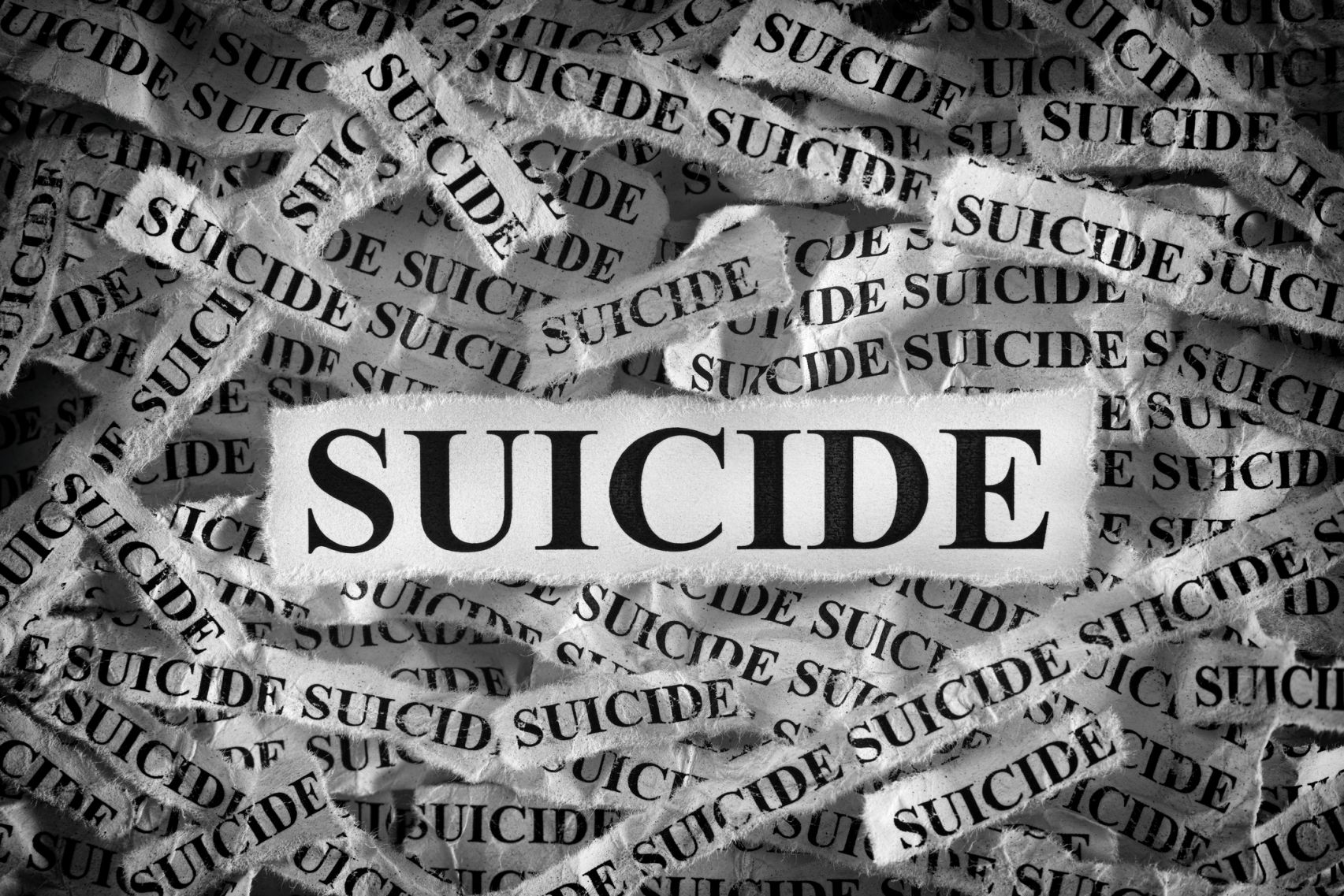Popular on s4story
- J French's #1 Album "I Don't Believe in Bad Days" Enters the Grammy Conversation - 239
- Political Division and Safety Concerns Drive Record Number of Americans to Seek "Golden Visas," La Vida Survey Finds - 177
- PatientNow Acquires Recura, the AI Growth Engine Powering Practice Growth - 144
- Isaac Newton's Remarkable 2060 Prophecy May Actually Point to 2030 - 128
- Edu Alliance Group Launches the Center for College Partnerships and Alliances - 127
- Author s.e.t. Releases New Dark Fantasy - Grand Challenge – Book 1: Strength - 127
- OddsTrader Reveals Early Favorites and Best Bets to Win March Madness 2026 - 125
- Zachary Hunchar Unleashes His Debut Horror Novel — The Grange - 108
- Preston Dermatology & Skin Surgery Center and Dr. Sheel Desai Solomon Dominate Raleigh's Best Awards from The News & Observer - 102
- 'Wild Hermit Wellness' Has Achieved Bestseller Status in Just 2 Months Since Launch Of Organic Skincare Line
Dispelling Holiday Suicide Myth: CDC Data Shows Suicide Rates are Lowest in December; International Survivors of Suicide Day Emphasizes Need for Ac
S For Story/10677896
The Centers for Disease Control (CDC) states that the holiday suicide myth supports misinformation about suicide and might actually hinder prevention efforts.
CLEARWATER, Fla. - s4story -- As communities observe International Survivors of Suicide Day on November 22nd, the Citizens Commission on Human Rights (CCHR) Florida is taking the opportunity to address a persistent and harmful myth surrounding suicide during the holiday season. Contrary to widespread media narratives and public perception, CDC data definitively shows that suicide rates actually decrease in December and are among the lowest of the year—making the holiday suicide myth a dangerous piece of misinformation that may be undermining suicide prevention efforts.
Despite hundreds of billions of dollars spent annually on mental health interventions, suicide remains a significant public health crisis in the United States. More than 49,300 people died by suicide in 2023, with suicide ranking as the 11th leading cause of death nationally and the second leading cause of death for individuals aged 10-34. Additionally, an estimated 1.5 million Americans attempted suicide in 2023, and 5.3% of U.S. adults (approximately 13.5 million people) reported having serious thoughts of suicide in the past 12 months. Yet even as resources continue to increase—with excess costs arising from mental health inequities alone reaching an estimated $477.5 billion in 2024—effective suicide prevention remains elusive.
CCHR, a watchdog organization dedicated to protecting mental health human rights, believes that widespread misinformation surrounding suicide significantly clouds prevention efforts. One of the most persistent and damaging myths is that suicide attempts surge during the holiday season.
The Media's Role in Perpetuating False Narratives
The Annenberg Public Policy Center has tracked media reports on suicide since 2000 and found that during the 2023-2024 holiday season, 58% of articles linking the holidays and suicide perpetuated the holiday suicide myth, while only 42% debunked it. This pattern of media coverage has ensured that the misconception remains deeply embedded in public consciousness, creating unwarranted anxiety during the holiday season while potentially diverting attention and resources away from periods of actual higher suicide risk.
More on S For Story
In a nationally representative survey conducted by the Annenberg Public Policy Center in 2023, four out of five adults incorrectly selected December as the "time of year in which the largest number of suicides occur"—even though the other months provided as choices typically have much higher suicide rates.
What the Data Actually Shows
The CDC has emphatically stated that the holiday suicide myth supports misinformation and might actually hinder prevention efforts. According to analysis of CDC data from 2022 and 2023, December consistently had the lowest average daily suicide rate of the year, ranking 12th in suicide rates among all months. November ranked 11th, and January ranked 10th. In stark contrast, the highest suicide rates occurred in the spring and summer months, with June, July, and August ranking 1st, 2nd, and 3rd respectively. This seasonal pattern has remained consistent over several decades and is observed in the southern hemisphere as well, where suicide rates peak during their summer months (December-February), further confirming that suicide rates are primarily influenced by seasonal factors rather than holiday-specific stressors.
Additional Concerns About Mental Health Treatment
Beyond the perpetuation of false information, CCHR has raised concerns about the growing reliance on antidepressant medications. According to new data released by the CDC's National Center for Health Statistics in 2025, more than 1 in 10 U.S. adults took prescription medication for depression in 2023, with women (15.3%) more than twice as likely to take these medications as men (7.4%). Additionally, the prevalence of depression in U.S. adolescents and adults increased 60% in the past decade.
Research published in Pediatrics in 2024 revealed that antidepressant dispensing to adolescents and young adults increased by 66.3% from January 2016 to December 2022, with the rate of increase accelerating by 63.5% after the COVID-19 outbreak in March 2020. Notably, this dramatic expansion in antidepressant usage has occurred despite documented evidence that side effects from these medications can include suicidal thoughts and feelings.
More on S For Story
Furthermore, research has challenged the efficacy of suicide risk assessments. In a 2017 Scientific American article, psychiatrists Declan Murray and Patrick Devitt reported that 40 years of research on suicide risk assessment determined there is "no statistical method to identify patients at high-risk of suicide in a way that would improve treatment."
International Survivors of Suicide Day and a Call for Awareness
As November 22nd approaches, marking International Survivors of Suicide Day, the focus shifts to honoring those who have lost loved ones to suicide and supporting survivors in their grief and recovery. This observance underscores the importance of accurate, evidence-based information about suicide prevention and mental health treatment options that do not rely on potentially dangerous psychiatric drugs.
CCHR Florida invites individuals seeking accurate information about suicide and psychiatric drug side effects to visit the CCHR Center located in downtown Clearwater. Staff members are available to provide resources, education, and support for those navigating mental health concerns or seeking to understand treatment alternatives. Visitors can learn about the documented risks of psychiatric drugs, explore options for reporting adverse drug reactions, and access information on evidence-based mental health approaches. For more information, to report abuse, or to visit the CCHR Center in downtown Clearwater, please call 1-800-782-2878 or visit www.cchrflorida.org.
About CCHR: Initially established by the Church of Scientology and renowned psychiatrist Dr. Thomas Szasz in 1969, CCHR's mission is to eradicate abuses committed under the guise of mental health and enact patient and consumer protections. L. Ron Hubbard, founder of Scientology, first brought psychiatric imprisonment to wide public notice: "Thousands and thousands are seized without process of law, every week, over the 'free world' tortured, castrated, killed. All in the name of 'mental health,'" he wrote in March 1969.
Despite hundreds of billions of dollars spent annually on mental health interventions, suicide remains a significant public health crisis in the United States. More than 49,300 people died by suicide in 2023, with suicide ranking as the 11th leading cause of death nationally and the second leading cause of death for individuals aged 10-34. Additionally, an estimated 1.5 million Americans attempted suicide in 2023, and 5.3% of U.S. adults (approximately 13.5 million people) reported having serious thoughts of suicide in the past 12 months. Yet even as resources continue to increase—with excess costs arising from mental health inequities alone reaching an estimated $477.5 billion in 2024—effective suicide prevention remains elusive.
CCHR, a watchdog organization dedicated to protecting mental health human rights, believes that widespread misinformation surrounding suicide significantly clouds prevention efforts. One of the most persistent and damaging myths is that suicide attempts surge during the holiday season.
The Media's Role in Perpetuating False Narratives
The Annenberg Public Policy Center has tracked media reports on suicide since 2000 and found that during the 2023-2024 holiday season, 58% of articles linking the holidays and suicide perpetuated the holiday suicide myth, while only 42% debunked it. This pattern of media coverage has ensured that the misconception remains deeply embedded in public consciousness, creating unwarranted anxiety during the holiday season while potentially diverting attention and resources away from periods of actual higher suicide risk.
More on S For Story
- Landry M. Simmons Jr. Releases Powerful New Memoir Roots of Resilience: Unveiling Our History
- New Smile Now Introduces RAYFace 3D Scanner to Advance Digital Surgery
- Ali Alijanian, DDS Featured in The Profitable Dentist Magazine
- My Utmost for His Highest — Oswald Chambers
- "Meet the Eatmons" Offer Financial Advice ahead of the Holidays
In a nationally representative survey conducted by the Annenberg Public Policy Center in 2023, four out of five adults incorrectly selected December as the "time of year in which the largest number of suicides occur"—even though the other months provided as choices typically have much higher suicide rates.
What the Data Actually Shows
The CDC has emphatically stated that the holiday suicide myth supports misinformation and might actually hinder prevention efforts. According to analysis of CDC data from 2022 and 2023, December consistently had the lowest average daily suicide rate of the year, ranking 12th in suicide rates among all months. November ranked 11th, and January ranked 10th. In stark contrast, the highest suicide rates occurred in the spring and summer months, with June, July, and August ranking 1st, 2nd, and 3rd respectively. This seasonal pattern has remained consistent over several decades and is observed in the southern hemisphere as well, where suicide rates peak during their summer months (December-February), further confirming that suicide rates are primarily influenced by seasonal factors rather than holiday-specific stressors.
Additional Concerns About Mental Health Treatment
Beyond the perpetuation of false information, CCHR has raised concerns about the growing reliance on antidepressant medications. According to new data released by the CDC's National Center for Health Statistics in 2025, more than 1 in 10 U.S. adults took prescription medication for depression in 2023, with women (15.3%) more than twice as likely to take these medications as men (7.4%). Additionally, the prevalence of depression in U.S. adolescents and adults increased 60% in the past decade.
Research published in Pediatrics in 2024 revealed that antidepressant dispensing to adolescents and young adults increased by 66.3% from January 2016 to December 2022, with the rate of increase accelerating by 63.5% after the COVID-19 outbreak in March 2020. Notably, this dramatic expansion in antidepressant usage has occurred despite documented evidence that side effects from these medications can include suicidal thoughts and feelings.
More on S For Story
- Inspiring New Book "The Things That Molded the Clay" by Joseph Marlon Clay Launches Nationwide
- CCHR: Study Finds Involuntary Commitment Fails to Prevent Suicide, Raises Risk
- Slotozilla's Q3 2025: SBC Lisbon Outcomes and Partnership Expansion
- Historic Announcement for the Global Car Rental Industry
- A Room of Their Own: Virginia Woolf's Classics Reimagined for a New Generation
Furthermore, research has challenged the efficacy of suicide risk assessments. In a 2017 Scientific American article, psychiatrists Declan Murray and Patrick Devitt reported that 40 years of research on suicide risk assessment determined there is "no statistical method to identify patients at high-risk of suicide in a way that would improve treatment."
International Survivors of Suicide Day and a Call for Awareness
As November 22nd approaches, marking International Survivors of Suicide Day, the focus shifts to honoring those who have lost loved ones to suicide and supporting survivors in their grief and recovery. This observance underscores the importance of accurate, evidence-based information about suicide prevention and mental health treatment options that do not rely on potentially dangerous psychiatric drugs.
CCHR Florida invites individuals seeking accurate information about suicide and psychiatric drug side effects to visit the CCHR Center located in downtown Clearwater. Staff members are available to provide resources, education, and support for those navigating mental health concerns or seeking to understand treatment alternatives. Visitors can learn about the documented risks of psychiatric drugs, explore options for reporting adverse drug reactions, and access information on evidence-based mental health approaches. For more information, to report abuse, or to visit the CCHR Center in downtown Clearwater, please call 1-800-782-2878 or visit www.cchrflorida.org.
About CCHR: Initially established by the Church of Scientology and renowned psychiatrist Dr. Thomas Szasz in 1969, CCHR's mission is to eradicate abuses committed under the guise of mental health and enact patient and consumer protections. L. Ron Hubbard, founder of Scientology, first brought psychiatric imprisonment to wide public notice: "Thousands and thousands are seized without process of law, every week, over the 'free world' tortured, castrated, killed. All in the name of 'mental health,'" he wrote in March 1969.
Source: Citizens Commission on Human Rights of Florida
0 Comments
Latest on S For Story
- London Based Author Buppha Witt Launches Her Powerful Memoir to Explore A Universal Theme of Privacy
- Fulton County & Grow Your World Amplify Atlanta Youth Through the Youth Audio Collective
- 2026 Oscars Betting Odds: One Battle After Another Favored for Best Picture
- Allen Field Co., Inc. Components Selected for Esko ArtiosCAD 3D Component Library
- New Children's Book "You Can Do Hard Things" Inspires Courage and Resilience in Young Readers
- Thirteen Reasons Why Gyminny Kids Is San Diego's Best Gymnastics Gym
- Heritage At Manalapan - A New Luxury Single Family Home Community Coming Late 2025
- The Lashe® Announces Exclusive November Savings for Lash and Beauty Professionals
- Corcoran DeRonja Real Estate Welcomes Siobhán Simões to Its Growing Team
- The Movement: Fall in Love with Reading
- November is Lung Cancer Awareness Month: Screening Saves Aims to Increase Access to Lung Screenings in NC
- Eric Misak Unveils New Romantic Novel — Brushstrokes From the Heart
- Valeo Health Leads a New Era of Longevity and Preventive Health in the UAE
- Torch Entertainment Presents The Frozen Zoo
- FARINA: A Cinematic Crime Noir Graphic Novel Launches on Kickstarter with Exclusive Rewards
- ILTexas Schools Honor Veterans with Moving Ceremony in the Colony Ridge Community
- Children's Author Debuts New Series
- Participate in the Jan-Carol Publishing Book Drive
- Sweet Memories Vintage Tees Debuts Historic ORCA™ Beverage Nostalgic Soda Collection
- UK Financial Ltd Celebrates Global Recognition as MayaCat (MCAT) Evolves Into SMCAT — The World's First Meme Coin Under ERC-3643 Compliance




